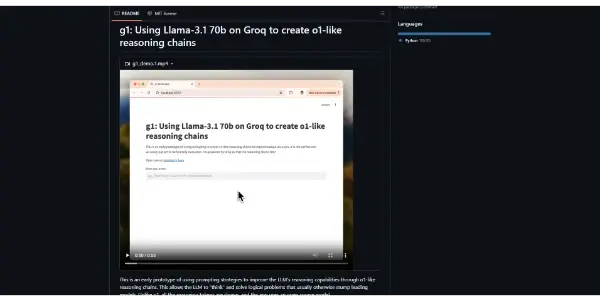G1 Llama Meta

An open-source language model inspired by OpenAI o1, based on Meta's Llama-3.1. Uses reasoning chains to solve complex problems, with an accuracy of around 70%.
G1 Llama Meta: A Powerful, Open-Source Reasoning LLM
G1 Llama Meta is a free, open-source large language model (LLM) drawing inspiration from OpenAI's o1 model and built upon Meta's Llama-3.1 foundation. Unlike simpler LLMs that primarily focus on generating text, G1 Llama Meta leverages reasoning chains to tackle more complex problems, showcasing a notable advancement in problem-solving capabilities within the open-source landscape. This article delves into its functionality, features, applications, and comparison to similar tools.
What G1 Llama Meta Does
G1 Llama Meta is designed to understand and respond to complex prompts requiring logical reasoning. It achieves this by breaking down problems into smaller, manageable steps, applying reasoning chains to each step, and then synthesizing the results into a coherent answer. While not perfect, its accuracy hovers around 70%, representing a significant leap forward for open-source LLMs in handling nuanced tasks. This contrasts with simpler models that often struggle with multifaceted queries or require highly specific prompting.
Main Features and Benefits
- Reasoning Chain Capabilities: This is the core differentiator. G1 Llama Meta doesn't just generate text; it reasons its way to a solution, making it suitable for tasks requiring logical deduction.
- Open-Source and Free: The model's open-source nature fosters community contribution, allowing for improvements and adaptations. Its free accessibility eliminates cost barriers for researchers and developers.
- Based on Llama-3.1: Built upon a robust and well-regarded foundation, G1 Llama Meta inherits the strengths of the Llama architecture, providing a solid base for its advanced reasoning capabilities.
- Improved Accuracy (Approx. 70%): While not perfect, the 70% accuracy rate indicates a significant improvement over simpler LLMs in handling complex problems. This accuracy is context-dependent and varies based on task complexity.
Use Cases and Applications
The reasoning capabilities of G1 Llama Meta open doors to various applications:
- Complex Question Answering: Answering questions that require multiple steps of reasoning and information synthesis.
- Code Generation and Debugging: Assisting in generating code snippets and identifying errors by applying logical steps to problem-solving.
- Data Analysis and Interpretation: Helping in interpreting complex datasets by applying logical reasoning to extract meaningful insights.
- Educational Tools: Creating interactive learning experiences that require students to engage in logical problem-solving.
- Research and Development: Serving as a foundation for further research into advanced LLM architectures and reasoning techniques.
Comparison to Similar Tools
G1 Llama Meta distinguishes itself from many other open-source LLMs by its explicit focus on reasoning chains. While models like Llama-2 offer strong text generation capabilities, G1 Llama Meta prioritizes problem-solving through logical deduction. Compared to proprietary models with similar reasoning capabilities (e.g., some versions of GPT models), G1 Llama Meta offers the significant advantage of being open-source and free, allowing for greater accessibility and community-driven development. However, it may lag behind proprietary models in terms of overall accuracy and breadth of knowledge.
Pricing Information
G1 Llama Meta is completely free to use, download, and modify, thanks to its open-source license. This makes it a highly accessible tool for a wide range of users and applications.
Conclusion
G1 Llama Meta represents a significant contribution to the open-source LLM community. Its emphasis on reasoning chains opens up exciting possibilities for tackling complex problems that were previously beyond the capabilities of many freely available models. While limitations exist in terms of overall accuracy, its open nature, coupled with its innovative approach to problem-solving, positions it as a valuable tool for researchers, developers, and anyone seeking to explore the potential of advanced reasoning in LLMs.